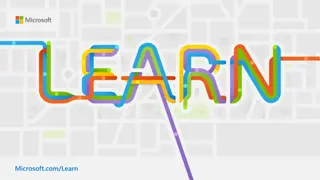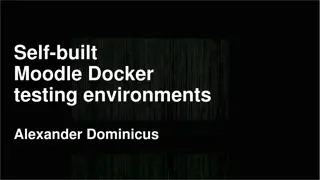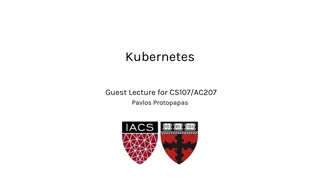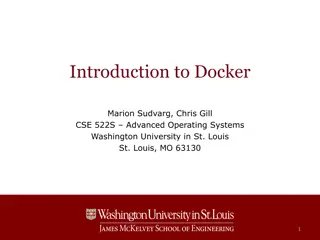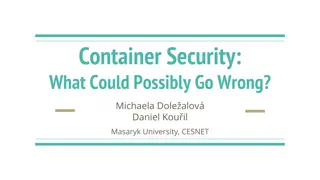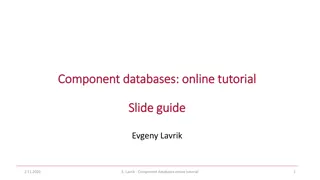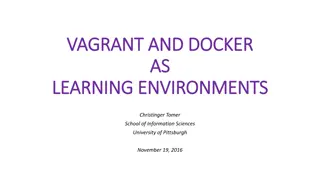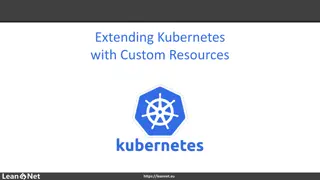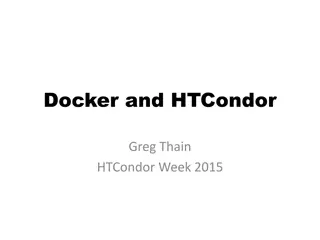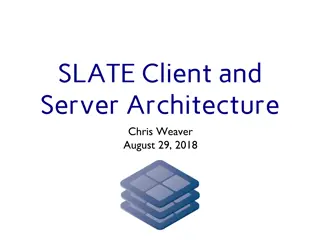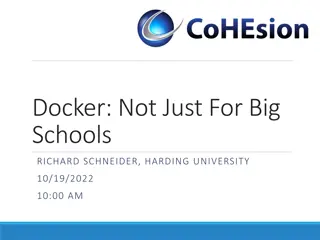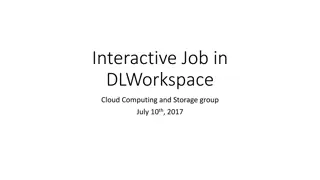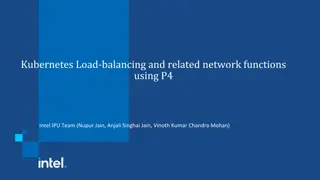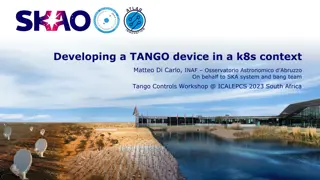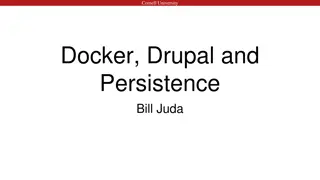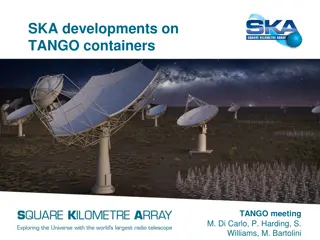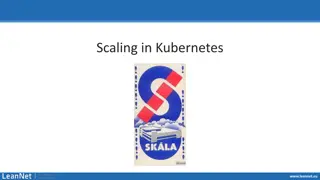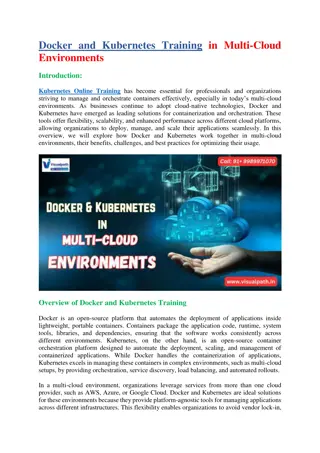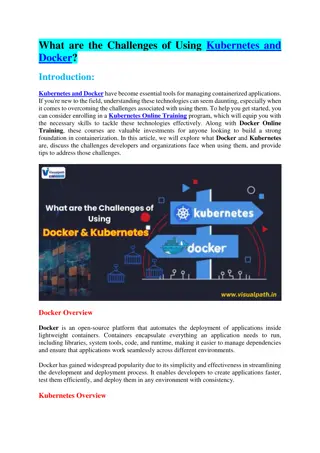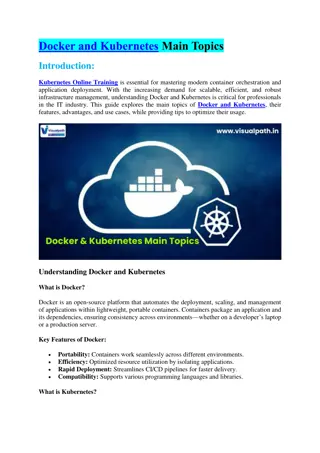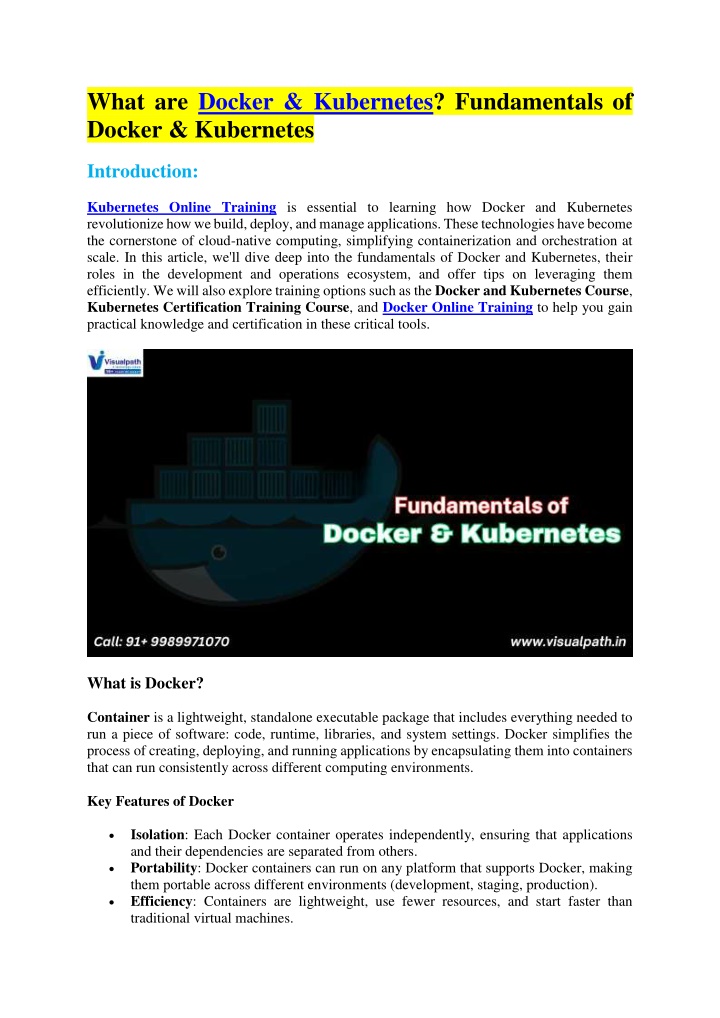
Docker and Kubernetes Training - Kubernetes Online Training
Visualpath Institute in Hyderabad provides outstanding Kubernetes Online Training, delivered by industry experts emphasizing hands-on learning. Their Docker Online Training is accessible worldwide, including in the USA, UK, Canada, Dubai, and Austral
Uploaded on | 4 Views
Download Presentation

Please find below an Image/Link to download the presentation.
The content on the website is provided AS IS for your information and personal use only. It may not be sold, licensed, or shared on other websites without obtaining consent from the author. If you encounter any issues during the download, it is possible that the publisher has removed the file from their server.
You are allowed to download the files provided on this website for personal or commercial use, subject to the condition that they are used lawfully. All files are the property of their respective owners.
The content on the website is provided AS IS for your information and personal use only. It may not be sold, licensed, or shared on other websites without obtaining consent from the author.
E N D
Presentation Transcript
What are Docker & Kubernetes? Fundamentals of Docker & Kubernetes Introduction: Kubernetes Online Training is essential to learning how Docker and Kubernetes revolutionize how we build, deploy, and manage applications. These technologies have become the cornerstone of cloud-native computing, simplifying containerization and orchestration at scale. In this article, we'll dive deep into the fundamentals of Docker and Kubernetes, their roles in the development and operations ecosystem, and offer tips on leveraging them efficiently. We will also explore training options such as the Docker and Kubernetes Course, Kubernetes Certification Training Course, and Docker Online Training to help you gain practical knowledge and certification in these critical tools. What is Docker? Container is a lightweight, standalone executable package that includes everything needed to run a piece of software: code, runtime, libraries, and system settings. Docker simplifies the process of creating, deploying, and running applications by encapsulating them into containers that can run consistently across different computing environments. Key Features of Docker Isolation: Each Docker container operates independently, ensuring that applications and their dependencies are separated from others. Portability: Docker containers can run on any platform that supports Docker, making them portable across different environments (development, staging, production). Efficiency: Containers are lightweight, use fewer resources, and start faster than traditional virtual machines.
Version Control: Docker supports version control for containers, allowing you to track changes and revert to previous states. Docker enables developers to standardize the environment from development through production, eliminating the common works on my machine problem. Docker containers are integral in creating micro services architectures, where each service runs in its own container. What is Kubernetes? While Docker is responsible for creating containers, Kubernetes manages and orchestrates these containers across a cluster of machines. Kubernetes is highly extensible and supports many container runtimes, making it one of the most versatile tools in the container orchestration space. Key Features of Kubernetes Automated Deployment: Kubernetes automates the deployment of containerized applications, ensuring they are distributed efficiently across clusters. Scaling: Kubernetes can automatically scale applications up or down based on resource utilization and demand, making it highly flexible. Load Balancing: It automatically distributes network traffic to ensure application stability and efficient resource utilization. Self-Healing: If a container fails, Kubernetes automatically restarts or replaces it, ensuring minimal downtime. Service Discovery: Kubernetes provides built-in mechanisms for discovering services within the cluster, enabling seamless communication between components. Kubernetes works by managing a cluster of physical or virtual machines and orchestrating containers to ensure that applications run smoothly, even as demand increases. Docker vs. Kubernetes: How They Work Together While Docker is primarily focused on packaging and running containers, Kubernetes takes the orchestration process to the next level. Here's a simple way to understand the relationship between the two: Docker: Creates and runs the containers that hold your application and its dependencies. Kubernetes: Manages, schedules, and orchestrates these containers across multiple nodes, ensuring scalability, availability, and optimal resource usage. In essence, Docker is about creating containers, while Kubernetes is about managing these containers in production environments. Together, they form a powerful duo that empowers developers and system administrators to build scalable, flexible, and efficient cloud-native applications. Fundamentals of Docker and Kubernetes Understanding the fundamental components of Docker and Kubernetes is crucial for managing modern applications.
Docker Components: 1.Docker Engine: The core of Docker, responsible for creating, managing, and running containers. 2.Docker Hub: A cloud-based registry where users can share and access container images. 3.Docker Compose: A tool for defining and running multi-container Docker applications. Kubernetes Components: 1.Master Node: The central control unit of a Kubernetes cluster that manages workloads, schedules, and cluster activities. 2.Worker Nodes: Machines where the containers are deployed and managed by the Kubernetes master node. 3.Pods: The smallest deployable unit in Kubernetes, a pod typically contains one or more containers. 4.Services: Define how pods interact with each other, including communication and load balancing. 5.Namespaces: A way to divide cluster resources between users to avoid resource conflicts. Kubernetes Online Training: Why It Matters As the adoption of cloud-native technologies continues to grow, having hands-on experience and certification in Kubernetes is becoming increasingly important. Kubernetes Online Training programs provide structured learning paths to understand container orchestration, cluster management, and application scaling techniques. With comprehensive courses like the Kubernetes Certification Training Course, you can gain the skills required to become proficient in deploying and managing containerized applications on Kubernetes. Key benefits of Kubernetes Online Training include: Understanding core Kubernetes concepts such as pods, services, and deployments. Learning how to automate tasks such as scaling, load balancing, and self-healing. Gaining hands-on experience with real-world Kubernetes clusters. Preparing for industry-recognized certifications to enhance your career prospects. Docker and Kubernetes Course: Bridging the Gap The Docker and Kubernetes Course is designed to bridge the knowledge gap between Docker containerization and Kubernetes orchestration. This course typically covers: Containerization with Docker: Learn how to build, ship, and run containers using Docker. Kubernetes Fundamentals: Understand how Kubernetes manages containers in production environments. Deploying Applications: Best practices for deploying applications with Docker and Kubernetes.
Cluster Management: Techniques for managing Kubernetes clusters across multiple environments. Tips for Mastering Docker and Kubernetes 1.Start Small: Begin by understanding Docker s basics before diving into Kubernetes. Set up simple containers and gradually work towards orchestrating them. 2.Practice with Minikube: Use Minikube to run Kubernetes locally and experiment with deploying pods, services, and scaling applications. 3.Leverage Documentation: Both Docker and Kubernetes have extensive documentation. Familiarize yourself with these resources to troubleshoot issues and learn best practices. 4.Automate Everything: Leverage Docker Compose and Kubernetes automation features to minimize manual intervention and streamline workflows. 5.Enroll in Docker Online Training: Enrolling in Docker Online Training can help you gain a deeper understanding of containerization and hands-on skills to effectively manage Docker environments. Kubernetes Certification Training Course: Career Boost For professionals looking to validate their skills, the Kubernetes Certification Training Course offers the perfect opportunity to become certified. This course prepares you for the Certified Kubernetes Administrator (CKA) or Certified Kubernetes Application Developer (CKAD) exams, recognized as industry standards. Achieving these certifications will enhance your credibility and open up career opportunities in cloud computing, DevOps, and system administration. Conclusion Docker and Kubernetes are indispensable tools for building and managing modern applications in a cloud-native environment. Docker simplifies the process of creating, deploying, and running containers, while Kubernetes provides a robust platform for orchestrating these containers at scale. For anyone looking to master these technologies, Kubernetes Online Training, the Docker and Kubernetes Course, and the Kubernetes Certification Training Course are excellent resources that provide hands-on experience and certification opportunities. With the right training and practice, you can leverage the power of Docker and Kubernetes to build scalable, efficient, and resilient applications. By enrolling in Docker Online Training and Kubernetes Certification Training Courses, you can stay ahead of the curve and position yourself as a valuable asset in the ever-evolving world of cloud-native computing. Visualpath is the Best Software Online Training Institute in Hyderabad. Avail complete Docker and Kubernetes worldwide. You will get the best course at an affordable cost. Attend Free Demo
Call on - +91-9989971070. WhatsApp: https://www.whatsapp.com/catalog/919989971070/ Visit: https://www.visualpath.in/online-docker-and-kubernetes-training.html

